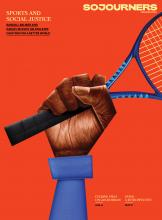
Illustrations by Julia Kuo
Searching for a Faithful Response to My ‘Privileged Otherness’
TO CROSS THE border into Lesotho — a landlocked, mountainous country surrounded entirely by South Africa — my friends and I rented a 4x4 and drove up the icy Sani Pass. We switchbacked up one of the most dangerous roads in the world and almost skidded off the cliff.
Slightly shaken but unscathed, we experienced time stretching as we drove through the pastoral city of Mokhotlong, dotted with thatch-roofed mud-and-stone huts. Herds of sheep, in no hurry to make way, blocked the dirt road.
We walked along the deserted street, admiring handicrafts at a rug shop before popping into a grocery store. I was surprised when a Chinese couple greeted us from behind the counter with a warm, “Ni hao.” As my friends and I spoke with them in rudimentary Mandarin (four of us were Chinese American, the fifth was white American), I learned that they had been living in Mokhotlong for many years, raising a family while running the store. We shared a laugh about the unlikelihood of Chinese people finding one another in these hinterlands and, after buying a couple of sodas, went on our way.
Down the road, we discovered another grocery store, staffed by a Chinese couple from a different province in China. What a wild fluke, I thought, that such an isolated town would have two Chinese-owned markets! I soon learned that it wasn’t a fluke at all — Chinese people are present in virtually every nation in Africa, whether as contracted laborers or as informal migrants. Since July 2008, when I visited Lesotho while living in South Africa for two months, the Chinese population in Africa has increased to more than 1 million, including large populations in South Africa, Madagascar, and Zambia but also scattered throughout smaller communities in South Sudan, Togo, and Senegal.
The awe of meeting Chinese people in rural Africa prompted me to examine my family’s migration story and my sense of otherness in the U.S. My parents left Hong Kong to come to the U.S. for college, planting roots here for the freedom and opportunities that didn’t exist back home. Shortly before I was born, they became Christians through a Chinese immigrant church in the Bay Area. When I was 3 years old, we resettled near the University of Iowa, where my dad worked as a cardiologist.
While my parents were members of a small but vibrant Chinese church, by junior high I started attending a large, white, evangelical church where I could fully understand the English language worship service and have peers my age. Bathed in a white-dominant environment both at school and at church, I subconsciously believed that my differences made me inferior and that white male theologians were the arbiters of true Christianity — after all, they were the only people preaching or quoted from the pulpit. This led me to “the misguided belief,” as Grace Ji-Sun Kim writes, “that white knowledge, theology, and spirituality were far greater than anything we had ever possessed.”
As I started wrestling with doubts during and after college, I languished in self-recrimination. I didn’t have the language or assertiveness to critique the overconfident dogmatism or the white normativity of the American evangelical church. If I didn’t fit the mold, I must be the problem. I never fully belonged in Iowa, despite chameleon-level assimilation, or in the church, which I considered my second home.
I was searching for purpose amid my privileged otherness. A career in medicine seemed one way to alleviate suffering and be useful in underserved settings — which is how I ended up on a medical student research fellowship in a South African hospital filled with patients dying from drug-resistant tuberculosis and HIV/AIDS. I was struck by the absence of barriers between faith, work, and activism, such as when dissidents at an academic conference on tuberculosis held protest signs against government health policies, or when hospital nurses opened each day with a morning hymn. And although I only spent one weekend in Lesotho, the encounters with the Chinese shopkeepers stayed with me as well.
After returning to the United States, I’d occasionally relay the story of the Mokhotlong grocers. Initially, reactions were a mix of surprise and delight: “Wow, Chinese people are everywhere!” my companions of various ethnicities would exclaim, smiling in awe. As years passed, though, there arose a harder edge to the comments about the Chinese diaspora, especially from certain white Americans, a tone of resentment and suspicion peppering the words: “Chinese people are everywhere.” How could we be everywhere yet still struggle to belong?
Read the Full Article

Got something to say about what you're reading? We value your feedback!


